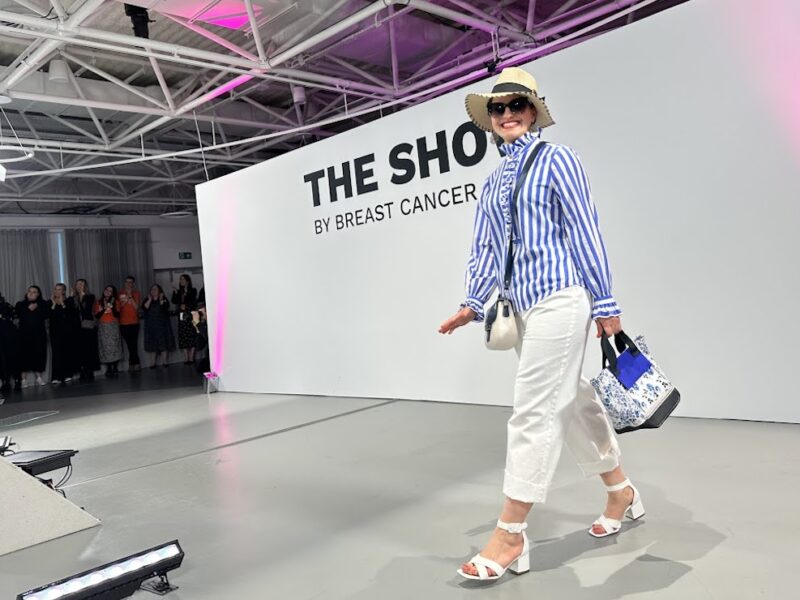
In this issue
From clinical trials to catwalks
Alumna Dalia Ismail (Biomedical Science, 2010) is a senior clinical trials manager, specialising in oncology. A breast cancer survivor herself,...
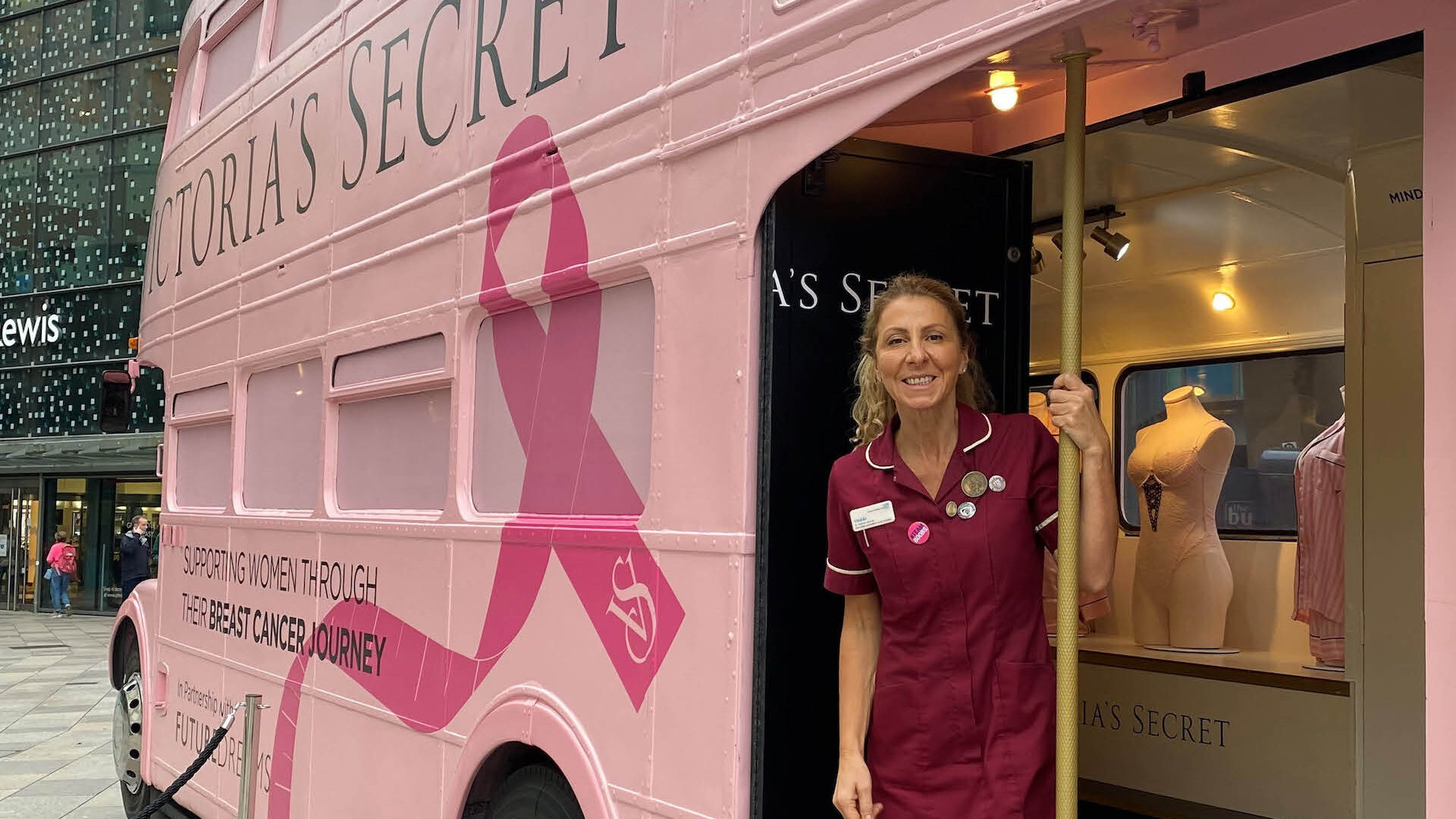
WHAT I’VE LEARNED
Read time: 7 mins
Dr Victoria (Vickki) Harmer AKC (Nursing, 1997; Doctorate in Healthcare, 2015) is a Consultant Nurse for breast care at Imperial College Healthcare NHS Trust, covering breast screening and symptomatic services. She leads a team of nurse specialists and is involved in both service delivery and improvement.
Alongside her work as a Consultant Nurse, Vickki is a leading figure in the breast care world and an ambassador for breast cancer awareness – whether that takes the form of increasing the uptake of breast screenings or consulting on film, television and radio to make sure that portrayals of breast cancer contain accurate information. She has worked with Marks & Spencer on designing swimwear for the post-mastectomy body, is a trustee for Against Breast Cancer – as well as holding positions on many other charity boards – and has contributed to numerous books, medical articles and journals.
Vickki’s career is truly varied. It has seen her be awarded grants, give lectures, attend receptions at Clarence House and Downing Street, win awards, give keynote speeches across the world, run nipple tattoo clinics and reach into sectors of society where breast cancer awareness may be lower. Here, she shares with InTouch Online what her role entails, what motivates her, which parts of her job mean the most to her, what she has learned and how her time at King’s helped her get to where she is today.
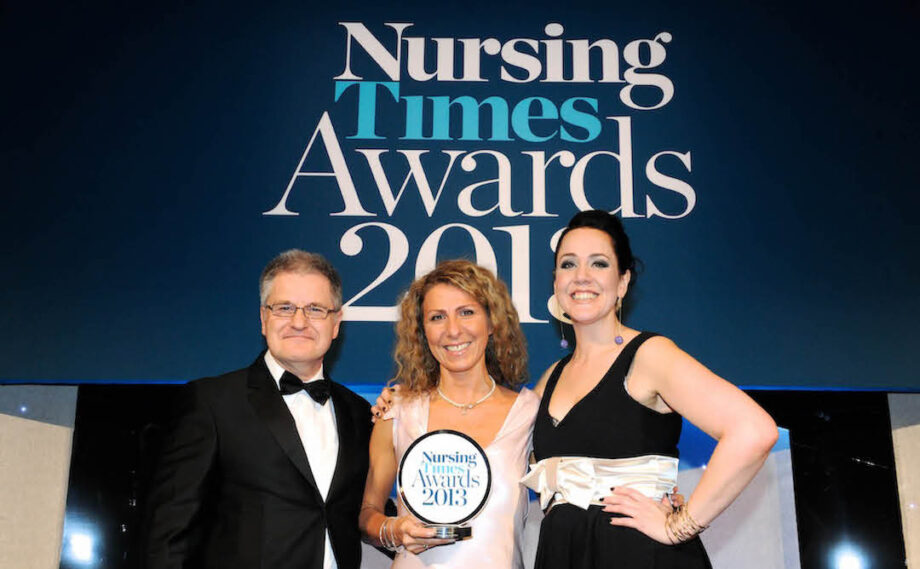
Vickki (centre) at the 2013 Nursing Times Awards
Vickki’s schedule is certainly full. But, alongside all her day-to-day responsibilities, she holds space to focus on raising breast awareness. It’s an area of deep importance to her, and she is making a very real difference.
She tells us: ‘I adore the breast awareness part of my job – it allows me to think creatively and come up with ideas and events that are contemporary and modern, with an aim to entice more people to be breast aware. It is such a positive thing, as it empowers people to be in charge of their own bodies. They are the expert in themselves, after all.’
Vickki points out to us the inequality in how people are accessing information about breast care – and she explains how certain groups of people are less likely to come forward, whether for screenings or in reporting any potential red-flag symptoms.
‘The surprise remains from men, as they too are at risk of being diagnosed with breast cancer. They have breast tissue, just less of it. The result is that men often present to us later, as they may not feel this is a risk they need to report.
‘There are great pockets of work also for the transgender population, for those with body dysmorphia, those that practise breast binding and many more. We need to offer guidance and support sensitively to those who do not feel in the right space with their body.’
In terms of raising awareness, Vickki also works closely with people with learning disabilities. She has been involved in health fairs and bespoke sessions in collaboration with charities like Certitude and Mencap, as well as local councils, with one of these events being featured on ITV Evening News. The more events she helps with, the more she learns about how to engage people and spread information in effective ways.
Most recently, Vickki’s passion for raising awareness around breast care has seen her travel to rural India, where she worked with the Ambuja Cement Foundation in Chandrapur. She tells us: ‘The attendees of the medical camp are now able to highlight breast awareness and red-flag signs of breast cancer, and promote women to present to their community worker at an earlier stage. It promotes a culture of openness, starts the conversation and attempts to start dissolving taboos associated with breast care.’
We ask Vickki what part of her role she is most passionate about, and she says the patient contact. She is passionate about both sides of a diagnosis – the physical and the emotional – so working directly with patients is of huge importance to her. Here is what she told us.
‘Working with people diagnosed with breast cancer is a huge privilege. You are walking alongside them when they have been diagnosed with a potentially life-threatening disease, and if you can make a difference to that person and their family and caregivers, that is hugely rewarding.
‘Being present when someone is diagnosed and unpacking their situation is multifaceted. You have to begin with the medical side (the treatments recommended for the physical) but also consider the psychological side.’
Part of the leadership aspect of Vickki’s role means she lectures regularly, recently for the Association of Breast Surgery’s masterclass for newly appointed consultant surgeons. She writes: ‘It’s a huge honour, as the agenda of the three-day course reads like a ‘Who’s Who’ of eminent professors and similar within the world of breast care.’
Her session is unique in that it considers the psychological side: ‘It’s the only session in the course dedicated to psychological issues – so about the patient as a person; I felt it was a huge honour and responsibility to do right by the patient and advocate for them.’ Indeed, it demonstrates how her work is instrumental to modern patient care and is really changing the patient experience.
Working with people diagnosed with breast cancer is a huge privilege. You are walking alongside them when they have been diagnosed with a potentially life-threatening disease, and if you can make a difference to that person and their family and caregivers, that is hugely rewarding.
Vickki’s passion for direct patient contact spans the breast cancer journey, right through to where some patients choose to have nipple tattoos (if they have had a breast reconstruction).
‘I adore my nipple tattoo clinic. People’s dust has settled a little – and, as it’s a clinic with the patient and myself alone in a room, there is a tendency for the talk to be quite reflective of the whole process. It’s an amazing privilege to perform this procedure. At the end, some get a little teary, as this is the sign-off of their surgery, and the tattoo makes such a difference to the appearance of the breast reconstruction.’
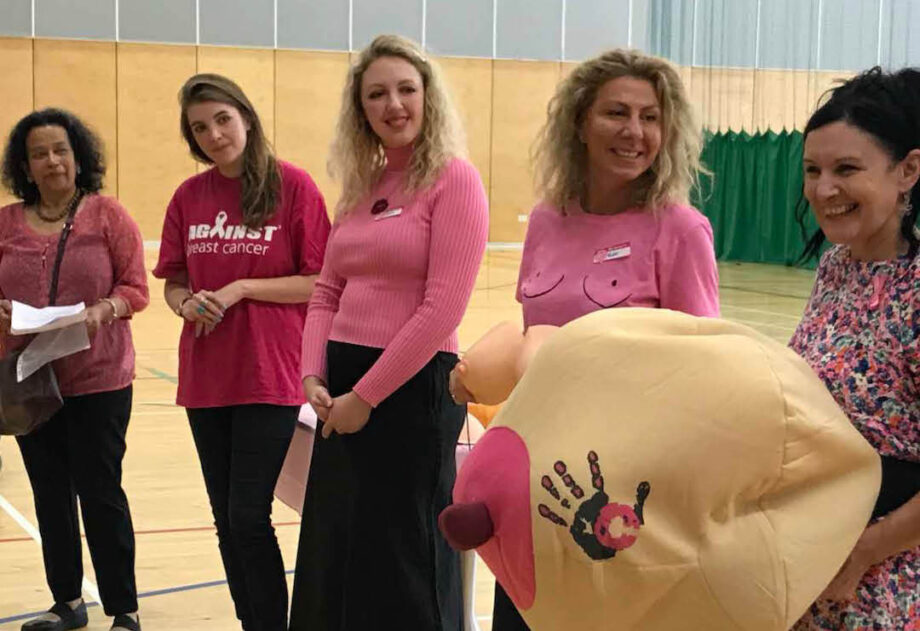
Vickki (second from right) at a Breast & Cervical Awareness afternoon
To get to where she is today, Vickki has put in a lot of hard work. She is very open about how she found studying hard graft and always has, and how she has gained valuable lessons along the way.
For Vickki’s MBA, which she did at Westminster Business School, she was initially turned down. She tells us: ‘For my MBA, I was declined to be given an interview. But my tenacity meant I called up the course supervisors and asked why. They said that I didn’t have enough management experience, to which I responded that I was running a ward. They reconsidered and I was accepted into the programme. It perhaps wasn’t the management experience they had expected, but they looked through a different lens and let me in. This is what I have often learned – that you really have to push yourself to get places.’
Her doctorate at King’s covered six years so was a huge part of her journey in nursing and healthcare – and this was even with her being the second fastest to finish in the cohort. She also did her BSc at King’s. Here, she tells us more about the pathway she took.
‘I did a diploma in healthcare first, so topping up to the degree was a given. I chose King’s due to its amazing reputation, plus my parents had studied medicine there. Studying does not come easy to me – I have to work quite hard and it takes longer for me than it does for others I think.
‘For the doctorate dissertation, I was taken under Professor Christine Norton’s wing. She was amazing and so were the secondary lecturers, Professor Patricia Grocott (who was and is the world authority on wound care) and Professor Elizabeth Barley. Ultimately, I had the most wonderful, wonderful doctorate supervisors, and was really proud and thrilled that I had done the study at King’s because it really, truly meant something.’
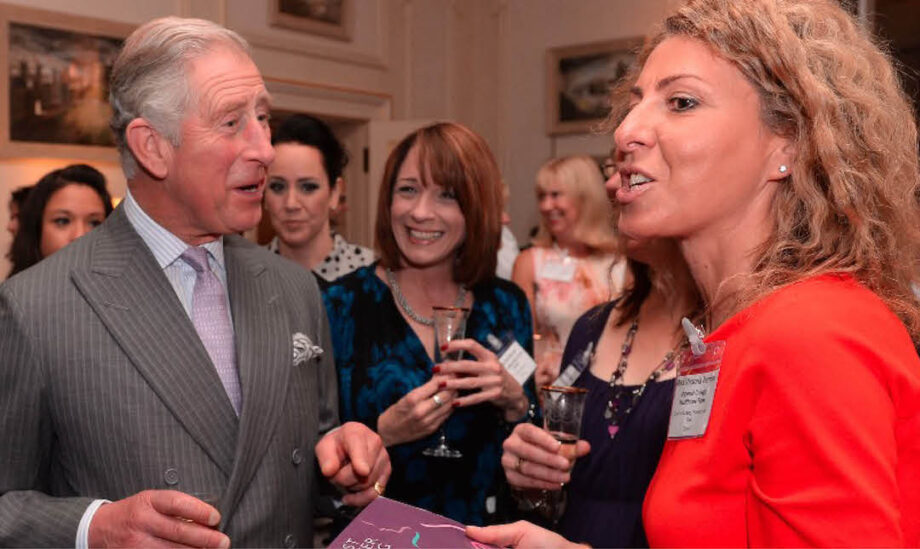
Vickki meets King Charles
We asked Vickki what advice she would give to someone considering a career in nursing.
‘Tenacity is vital, standing confident and strong. It’s paramount to think clearly and carefully, standing out solo if you need. I have swum upstream on occasion, and it has always come right in the end.’
Despite her phenomenal achievements and international acclaim, Vickki is incredibly grounded. She often has to pinch herself to believe it’s real, particularly when it comes to the travel involved in her work.
Ultimately, I had the most wonderful, wonderful doctorate supervisors, and was really proud and thrilled that I had done the study at King’s because it really, truly meant something.
‘Being invited (and paid) to give the keynote talk for the McGrath Foundation in Australia was insane – as was winning the Nursing Times Cancer Nursing Award. When I go overseas, I always think, “Wow, Mum, I’ve made it – they are shipping me out to them.”’
We’re pleased to say that Vickki has been back to King’s recently and recorded a video with us about what it takes to be a great nurse, which you can view below.
Did you know that here at King’s you can train to be a registered nurse in just two years (with an undergraduate degree in any subject), gain a master’s and receive a training grant while you study?
Nursing at King’s provides you with the skills and experience to become a future leader in healthcare. To find out more about the nursing courses we offer, watch these short videos or visit the King’s website.

Alumna Dalia Ismail (Biomedical Science, 2010) is a senior clinical trials manager, specialising in oncology. A breast cancer survivor herself,...
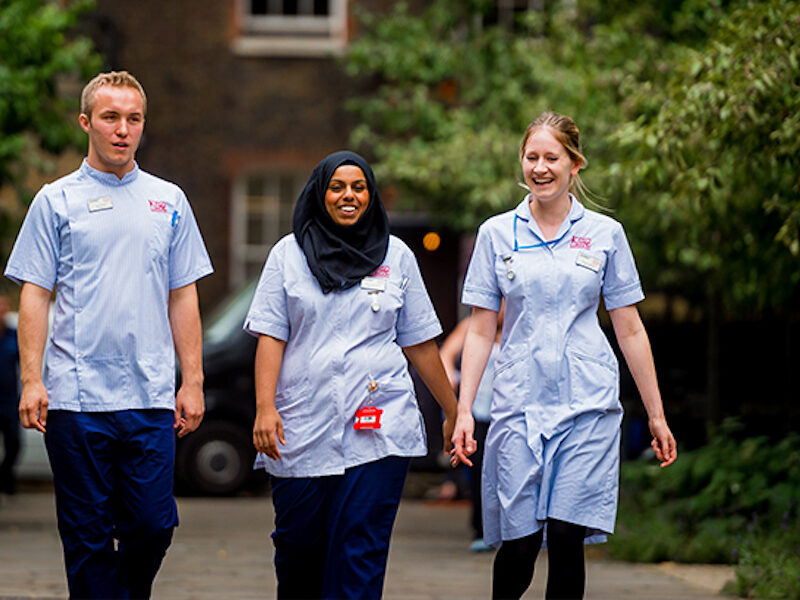
In honour of what would have been Florence Nightingale’s 200th birthday, the World Health Organization named 2020 the International Year...
Well, what can I say? If Dr Vickki Harmer doesn’t inspire you train to be a RN at KCL, then I really do give up! I feel very proud & grateful that I worked with Vickki for 8 yrs at Imperial College Healthcare NHS Trust as the Lead Macmillan Colorectal Cancer CNS. She was so supportive and helpful to me as a new CNS Team Lead & continued as such over the years. Vickki is an inspiration to everyone who is lucky enough to meet her.